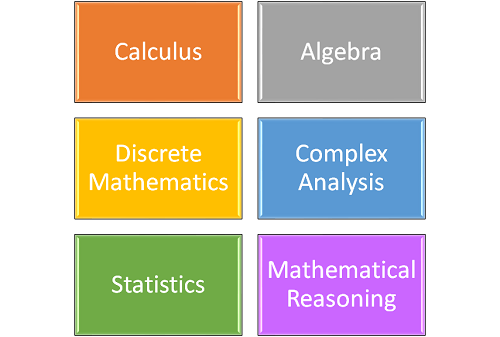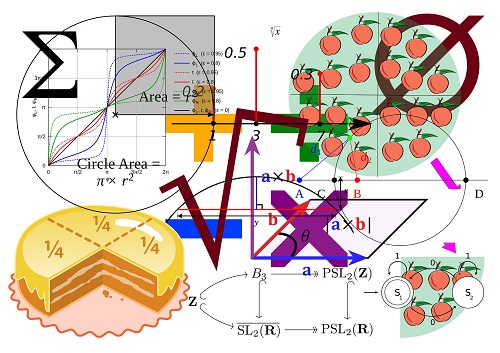The more you consider majoring in mathematics in college, the more you begin to wonder what the curriculum would be like. Of course, you will need to take plenty of math classes, but which ones? What other coursework will round out your schedule? Typically, undergraduate mathematics majors take core math classes, general education courses and studies in non-math subjects that relate to their intended careers.
Core Courses in Mathematics
You aren’t surprised that your curriculum as a math major will include plenty of math courses. Math is among your favorite subjects, and you wouldn’t be interested in the degree program otherwise. The types of math courses typically found in an undergraduate math degree program include algebra, differential equations and calculus, according to the United States Bureau of Labor Statistics (BLS).
Students should expect to take at least three, if not four, semesters of calculus. Most math curricula will include both abstract algebra and applied linear algebra, but some programs will also include modern algebra, an additional year of abstract algebra or another algebra class. Other math coursework you might find in your curriculum includes discrete mathematics, complex analysis, mathematical proof and problem solving, statistics, and mathematical reasoning. Math majors often have mathematical electives they can use to take further math courses that they find most interesting, such as differential geometry, topology and applied stochastic processes.
You might take a math seminar or capstone course, often at the end of your studies, during which you get the chance to apply what you’ve learned in the classroom. A math capstone may take the form of an internship, undergraduate research thesis or advanced project in problem-solving.
Arts, Sciences and the Humanities
Although many students prioritize career preparation over other outcomes of going to college, the point of attaining a higher education is to learn. Graduates from a college degree program I math – or any other subject area – should be well-educated on a variety of topics and should develop universal skills such as communication and critical-thinking skills. Many colleges and universities require that undergraduate students complete an array of classes in different subject areas to satisfy general education, or “gen ed,” requirements. These requirements can be surprisingly extensive, often accounting for one-third to one-half of an undergraduate student’s total college studies, according to Inside Higher Ed. Although their major falls under the category of a STEM (science, technology, engineering and mathematics) subject, math majors aren’t exempt from this requirement for well-rounded studies. Most general education requirements include courses in writing and composition, laboratory science, math, history, social science and the humanities.
One factor that determines what else fits into your curriculum is what kind of undergraduate degree you are seeking. Math degrees come in both Bachelor of Arts (B.A.) and Bachelor of Science (B.S.) varieties. A BA degree is considered a liberal arts degree. In colleges that offer both degree options, the math coursework for the B.A. and B.S. degrees are nearly identical, with the B.S. perhaps requiring one or two more math courses. As non-math coursework goes, the B.A. program will include more studies in the humanities, perhaps including a foreign language requirement that the B.S. degree does not include. Students in the B.S. program might take on slightly more coursework in the physical sciences.
In math, a broad but scientific subject of study, B.S. degrees don’t outrank B.A. degrees or vice versa. Employers respect both degrees. A B.S. degree might be the best choice for students intending to go to graduate school for math, while a B.A. offers greater flexibility.
IMAGE SOURCE: Pixabay, public domain
Complementary Career Courses
Mathematician, statistician and other math-related occupations find applications in many different fields and industries. One way students can improve their job prospects is by taking a sequence of courses in a non-math subject that is relevant to their professional interests.
For example, computers play an important role in the daily work of mathematicians, statisticians, actuaries and operations research analysts. By pursuing an emphasis or academic concentration in computer science or computer programming, students can learn skills that they will use on the job as well as a theoretical understanding of computation and algorithms. Other popular areas of emphasis within the field of mathematics include business, life sciences and even education. Whether you want to analyze business operations in search of opportunities for improvement, design the healthcare studies that test the effectiveness of medications or teach math in high school, the courses you choose to take in college can help shape the future of your career.
If your math program doesn’t include a career-related coursework requirement, you could choose to develop your own area of expertise by pursuing a relevant minor. The knowledge you gain is more important than the exact wording that describes your education.
Additional Resources
Are There Any Science Classes Required for a Degree in Math?
Are There Any Computer Classes Required for a Degree in Math?
Are There Any Business Classes Required for a Degree in Math?


